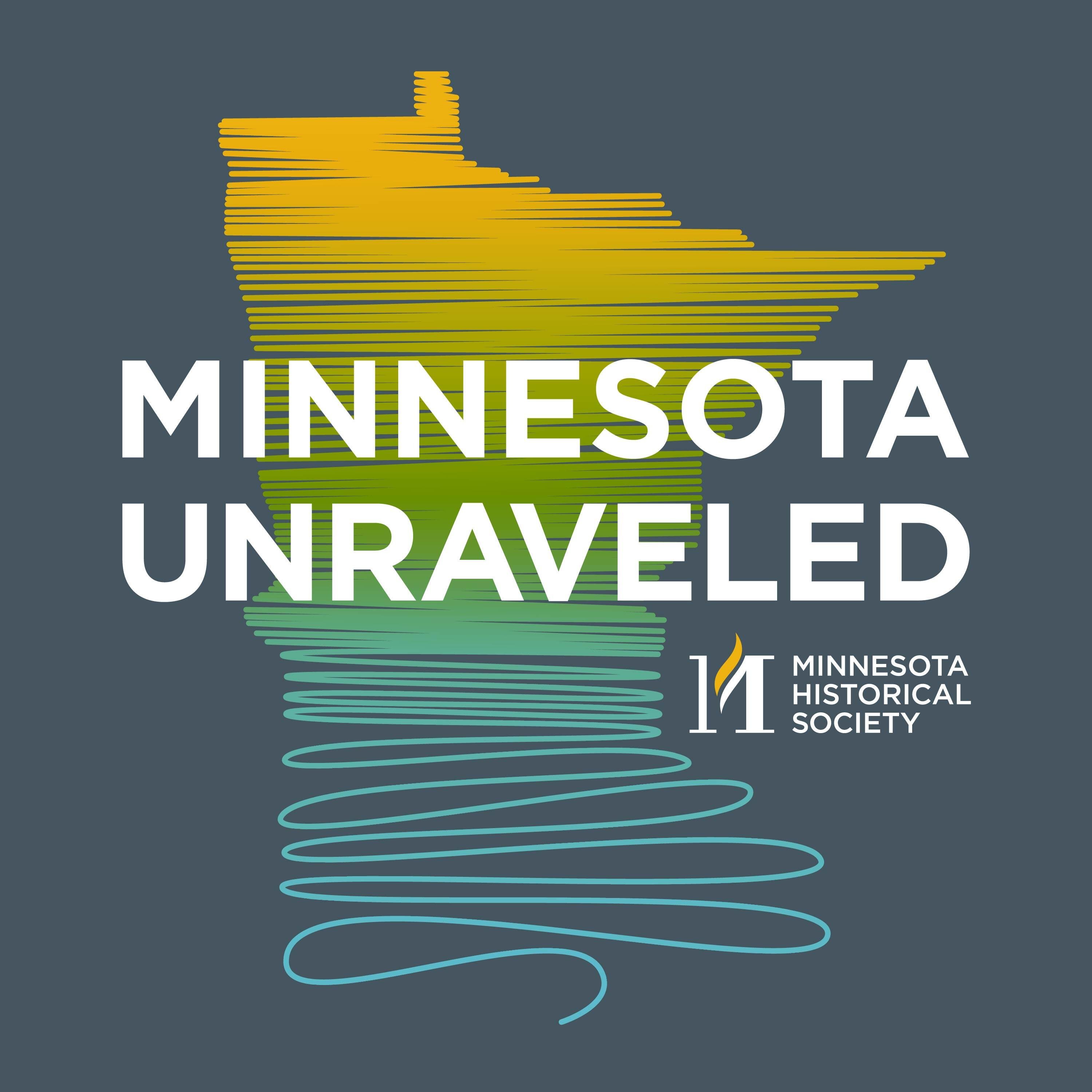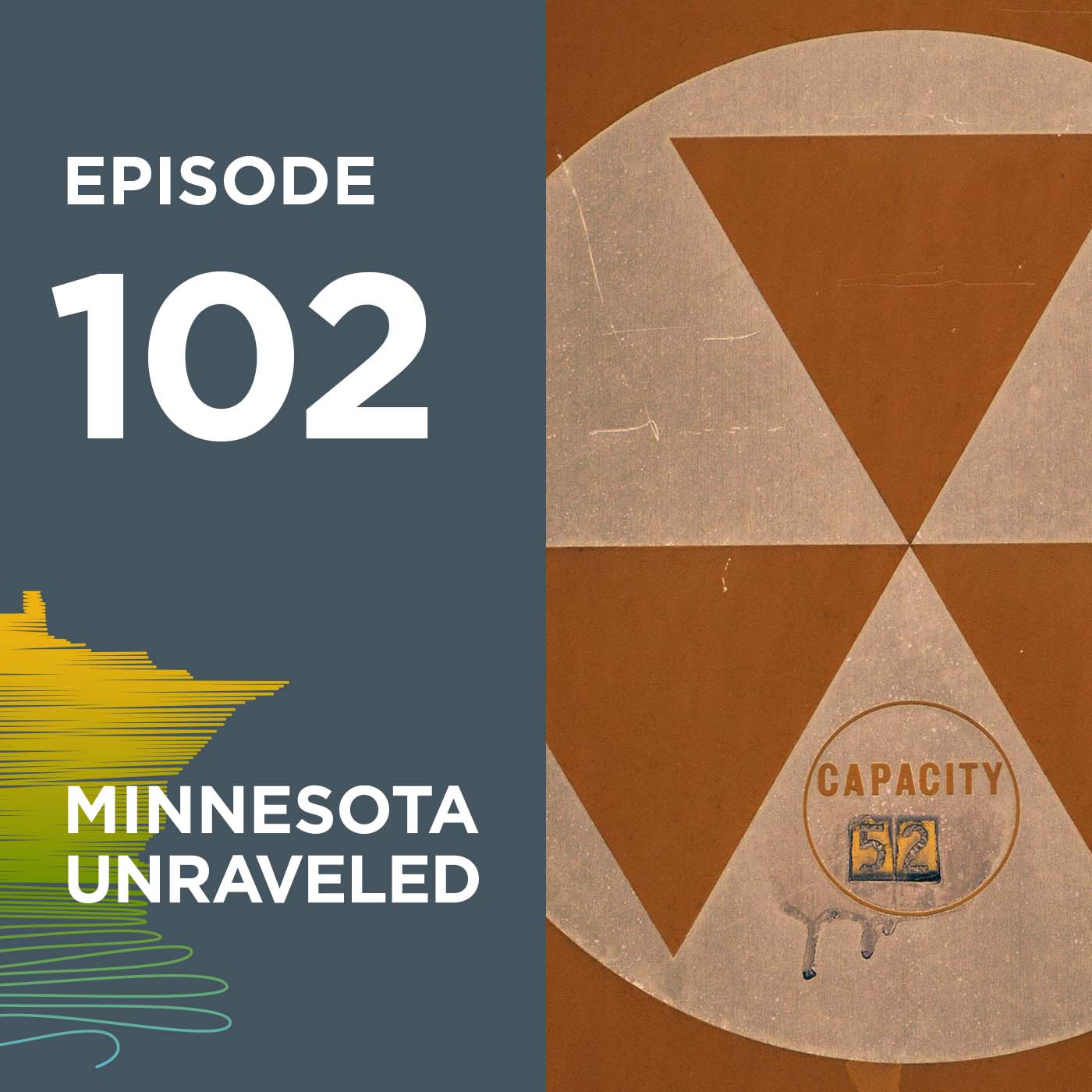Life Underground: Fallout Shelters in Minnesota (episode 102)
Dotted throughout the Twin Cities are fallout shelter signs. Chances are you’ve seen one of these black and yellow signs attached to a very sturdy building. Have you wondered: What purpose did they serve? Why were fallout shelters needed to begin with? What was it like to live in the atomic age?
For this second episode of MN Unraveled, historian and host Dr. Chantel Rodríguez explores the history of fallout shelters. What starts with a question about the origin of fallout shelter signs becomes an exploration of the family and the American way of life. She dives into this history with author Dave Kenney and historian Elaine Tyler May.

Transcripts
Guests

Dave Kenney
Dave Kenney is a historian, writer, and researcher. Having published more than a dozen history books, he has received many accolades, including winning the Minnesota Book Award, twice. Author of the sixth grade textbook Northern Lights: The Stories of Minnesota’s Past, Kenney has extensive knowledge around the many nuances of Minnesotan and specifically Twin Cities history.
He also works with private clients to record comprehensive histories, including but not limited to Polaris Inc, St. Paul Chamber Orchestra, and Gustavus Adolphus College. Beyond the page, Kenney has also appeared on TV segments, radio, and more.

Elaine Tyler May
Elaine Tyler May is a professor of American Studies and History and an author. Her scholarship centers on the twentieth century, with a focus on the ways issues normally considered part of private life – such as consumerism, security, and leisure – influence American political, cultural, and social values.
In addition to her books, May has written for the New York Times, the Los Angeles Times, Ms., Daily Beast, the Chronicle of Higher Education, and the Star Tribune, among others. She was recently chosen to be a Fullbright Distinguished Professor of American History at University College Dublin, Ireland.
Primary Sources
Berrien, F. K., Carol Schulman, and Marianne Amarel. “The Fallout-Shelter Owners: A Study of Attitude Formation.” The Public Opinion Quarterly 27, no. 2 (1963): 206–16. http://www.jstor.org/stable/2746915
Civil Defense Newsletter, August 1966. Published Records and Reports, 1950-1972. Minnesota Department of Civil Defense. Minnesota Historical Society.
Civil Defense Newsletter, February 1960, Published Records and Reports, 1950-1972, Minnesota Department of Civil Defense, Minnesota Historical Society.
Family Shelter Designs. Office of Civil Defense. Department of Defense. No date, ca 1960.
The Family Fallout Shelter. Office of Civil and Defense Mobilization, 1959.
Levine, Gene N., and John Modell. “American Public Opinion and the Fallout-Shelter Issue.” The Public Opinion Quarterly 29, no. 2 (1965): 270–79. http://www.jstor.org/stable/2747061
Manual for Fallout Program, Department of Civil Defense, State of Minnesota, 1962.
St. Paul Fallout Shelter Locations. Saint Paul Bureau of Civil Defense, no date (196?).
“This is your Twin City Area Evacuation Map,” Published Records and Reports, 1950-1972, Minnesota Department of Civil Defense, Minnesota Historical Society.
Secondary Sources
Barker-Devine, Jenny. “‘Mightier than Missiles’: The Rhetoric of Civil Defense for Rural American Families, 1950-1970.” Agricultural History 80, no. 4 (2006): 415–35. http://www.jstor.org/stable/4617775.
Bishop, Thomas. Every Home a Fortress: Cold War Fatherhood and the Family Fallout Shelter. University of Massachusetts Press, 2020. https://doi.org/10.2307/j.ctv138wqg2.9.
Civil Defense at Mayo Clinic During the Cold War. W. Bruce Fye Center for the History of Medicine. Mayo Clinic. https://libraryguides.mayo.edu/historicalunit/CivilDefense (accessed May 5, 2024).
Kenney, Dave. "Civil Defense in Minnesota, 1950–1974." MNopedia, Minnesota Historical Society. http://www.mnopedia.org/civil-defense-minnesota-1950-1974 (accessed May 5, 2024).
___________. “Cold War Couple: Ed and Thelma Mahowald.” In Northern Lights: The Stories of Minnesota’s Past, 2nd Edition. Minnesota Historical Society, 2013.
Lichtman, Sarah A. “Do-It-Yourself Security: Safety, Gender, and the Home Fallout Shelter in Cold War America.” Journal of Design History 19, no. 1 (2006): 39–55. http://www.jstor.org/stable/3838672.
Masco, Joseph. “Life Underground: Building the Bunker Society.” Anthropology Now 1, no. 2 (2009): 13–29. http://www.jstor.org/stable/41203538.
May, Elaine Tyler. Homeward Bound: American Families in the Cold War Era. Basic Books, 2008.
McEnaney, Laura. Civil Defense Begins at Home: Militarization Meets Everyday Life in the Fifties, 40–67. Princeton University Press, 2000. https://doi.org/10.2307/j.ctv15r577t.6.
Monteyne, David. Fallout Shelter : Designing for Civil Defense in the Cold War. Minneapolis: University of Minnesota Press, 2011.
Oakes, Guy. “The Cold War Conception of Nuclear Reality: Mobilizing the American Imagination for Nuclear War in the 1950’s.” International Journal of Politics, Culture, and Society 6, no. 3 (1993): 339–63. http://www.jstor.org/stable/20007095.
Rose, Kenneth D. One Nation Underground : The Fallout Shelter in American Culture. New York University Press, 2001.
Spencer, Brett. “From Atomic Shelters to Arms Control: Libraries, Civil Defense, and American Militarism during the Cold War.” Information & Culture 49, no. 3 (2014): 351–85. http://www.jstor.org/stable/43737397.
Szasz, Andrew. “The Fallout Shelter Panic of 1961.” In Shopping Our Way to Safety: How We Changed from Protecting the Environment to Protecting Ourselves, New edition, 15–55. University of Minnesota Press, 2007. http://www.jstor.org/stable/10.5749/j.ctttt1jw.6
Vesentini, Andrea. “Sheltering Time: The Containment of Everyday Life in Nuclear-Shelter Film Narratives.” Material Culture 47, no. 2 (2015): 41–58. http://www.jstor.org/stable/44507757.
Audio Clips
Analyzing Designated Fallout Shelters: Afternoon Tea with Primary Sources
1950s Civil Defense Fallout Shelter Supplies Film
 MNHS Podcast
Nov 21, 2024 2:08:57 PM
MNHS Podcast
Nov 21, 2024 2:08:57 PM


